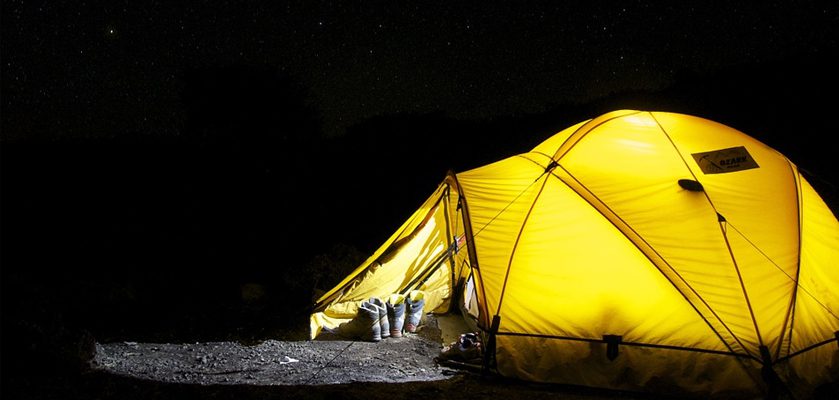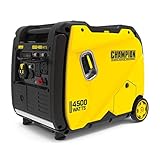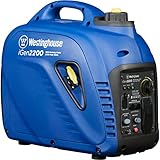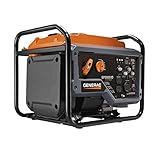One would think that getting any inverter generators should be fine. I mean, they’re supposed to be “smarter” than regular generators, right?
Sadly, most inverter generators nowadays aren’t up to their marketing image. I mean, most of them:
- Are made of cheap components and manufactured in countries where quality assurance isn’t a priority
- Don’t provide the wattage needed to run most electronic devices needed to go camping in peace
- Provide short runtimes which is very annoying for people trying to enjoy a nice camping day
Due to this, I decided to make an effort and research as many inverter generators as I could to find those that fitted the needs of people that love to go camping.
The Best Inverter Generators for Camping
These are the best inverter generators for camping I found after extensive research.
- Champion 100573 Open Frame Inverter Generator for Camping
- WEN 56235i Portable Inverter Generator for Camping
- Westinghouse iGen4500 Portable Inverter Generator for Camping
- WEN 56380i Super Quiet 3800-Watt Portable Inverter Generator for Camping
- Champion 3400-Watt Dual Fuel Inverter Generator for Camping
- Champion Power Equipment 200986 4500-Watt Portable Inverter Generator for Camping
- Generac 7129 GP3000i Inverter Generator for Camping
- Westinghouse iGen2200 Inverter Generator for Camping
- Generac GP3500iO Inverter Generator for Camping
- Champion Power Equipment 100307 Inverter Generator for Camping
1. Champion 100573 Open Frame Inverter Generator for Camping
Features
- Wattage: 4000 starting watts and 3500 running watts
- Runtime: 17 hours at 25% load
- Fuel: Gasoline
Outlets: 1x 120V 30A RV (TT-30R), 2x 120V 20A household outlets (5-20R), 1x 12V DC outlet with a dual USB adapter
Nobody likes wasting hundreds of dollars on an inverter generator that doesn’t deliver enough wattage for a whole camping day.
This Champion 100573 inverter generator offers 4000 starting watts and 3500 running watts which is more than enough wattage to juice up your essential gadgets for an entire day. Moreover, it lasts up to 17 hours running at a 25% load.
Its open-frame design makes it much lighter and quieter than other inverter generators. In fact, it only makes 64 decibels of noise when in operation which is a bit more noise than a normal conversation. This is perfect to keep your inverter generator from ruining a nice camping day.
Last but not least, this generator is very easy to carry around thanks to its never-flat tires and easy-grip handles.
Pros
- Open frame design allows the generator to run quieter and be substantially lighter than the competition
- Clean power production (less than 3% THD)
- Its Economy mode saves on fuel when you most need it at the campsite
- It runs at only 64 dBA which is a bit louder than a normal conversation
- 3500 running watts (4000 starting watts) is more than enough wattage for camping activities
- It’s parallel ready, meaning you can connect it to another generator to get more power
- Wireless remote start and electric start button makes things a bit more convenient at the camping site
- It runs up to 17 hours on gasoline (at 25% load) thanks to its 2.9-gallon tank
- Cold start technology allows the generator to start right away when camping in the middle of the harsh winter
- Low oil shutoff sensor keeps the generator from breaking if running low on oil
- Never flat tires and easy-grip handles make it very easy to move this generator around the campsite
- CARB compliant
Cons
- You must add your own oil at first which is very inconvenient
2. WEN 56235i Portable Inverter Generator for Camping
Features
- Wattage: 2350 starting watts and 1900 running watts
- Runtime: 10.5 Hours at a quarter-load
- Fuel: Gasoline
Outlets: 2x three-prong 120V receptacles, 1x 12V DC receptacle, 2x 5V USB ports
Bringing an inverter generator to a campsite is supposed to enhance the camping experience instead of ruining it. This is why I recommend people to get inverter generators with enough wattage to power essential gadgets for camping.
This Wen 56235i inverter generator delivers 2350 starting watts and 1900 running watts which I think is enough to power camping equipment.
Thanks to its 1-gallon tank it can run for up to 10.5 hours is run at 25% load.
Even though it doesn’t have wheels, it’s pretty light at only 39 pounds making it very easy to carry around.
Pros
- It only weighs 39 pounds
- It has a 1-gallon tank that allows for 10.5 hours of runtime at 25% load
- It runs very quietly
- 1900 running watts (2350 starting watts) is enough wattage for powering phones, laptops, and other essentials at the campsite
- Low-oil and overload indicator maximizes the inverter generator’s lifespan
- Parallel connection capabilities between any two WEN generators
- Eco mode option maximizes runtime
Cons
- It doesn’t have a wattage use indicator
- Doesn’t have wheels
3. Westinghouse iGen4500 Portable Inverter Generator for Camping
Outlets: 5 x 20R 120V Duplex Household Outlet, 1x RV-Ready Tt-30R 30 Amp Outlet, 2x USB Outlets
This Westinghouse inverter generator comes with a 3.4-gallon tank that takes about 18 hours to empty. This is more than enough to power all sorts of equipment and gadgets on a camping trip.
Moreover, this generator runs at 3700 running watts and 4500 starting watts making only 53 decibels of noise (quieter than a normal conversation between two people) which makes it perfect for entire families that want their phones and laptops powered through their camping days.
Convenience-wise, this inverter generator comes with:
- Remote start and an electric push start button
- Rotating display that shows important information such as lifetime hours, fuel level, and power output
- 30 amp service ideal for RVs
In short, I’d say that if you want a powerful inverter generator to take to the camping site, you should take a good look at this Westinghouse one!
Pros
- It runs for up to 18 hours thanks to its 3.4-gallon tank
- 3700 running watts (4500 starting watts) generates clean energy (less than 3% THD) which is perfect for powering gadgets at the campsite
- Remote start and electric button makes starting the inverter generator a very simple process
- It provides a 30 amp service ideal for RVs which go hand in hand with campsites
- It operates at 53 decibels which is even less than the noise made in a regular conversation
- Rotating digital display reads fuel level, power output, and lifetime hours
Cons
- Wheels feel a bit squish but they do the job
4. WEN 56380i Super Quiet 3800-Watt Portable Inverter Generator for Camping
Features
- Wattage: 3800 starting watts and 3400 running watts
- Runtime: 8.5 hours at half load
- Fuel: Gasoline
Outlets: 2x three-prong 120V receptacles, 1x AC 120V NEMA TT-30R RV receptacle, 1x 12V DC receptacle, 1x 5V USB port
Look. If you wanna take your inverter generator camping, then it better have enough wattage. Otherwise, you’d be putting the camping trip at risk.
In that context, this WEN 56380i inverter generator comes with features such as:
- 3400 running watts and 3800 starting watts which is more than sufficient for powering your electronic devices at the campsite
- 8.5 hours of runtime when the inverter generator is loaded at 50%
Additionally, it operates at 57 decibels. This is about the same noise made in a normal conversation which is very impressive if you asked me.
In terms of convenience, it comes with a fuel shutoff that keeps blockages from happening and a digital display that makes it very easy to read important indicators (i.e. fuel levels and load information).
Pros
- 3800 starting watts and 3400 running watts is enough wattage for camping activities
- Digital load and fuel display
- EPA III and CARB Compliant
- It produces clean power which protects electronic devices
- Fuel shutoff prevents blockages caused by stagnant fuel
- Maximum fuel efficiency thanks to ECO-MODE option
- 8.5 runtime at 50% load (thanks to its 2.2-gallon fuel tank) is more than enough for a full camping’s day
- It operates at 57 decibels which is very quiet considering the power behind this inverter generator
- It comes with folding handles for easy portability
- Parallel connection allows for wattage share between two generators
- Electric start
Cons
- It’s a bit too heavy to carry around
5. Champion 3400-Watt Dual Fuel Inverter Generator for Camping
Features
- Wattage: Starting 3400 watts and 3100 running watts
- Runtime: Up to 7.5 hours on gasoline and up to 14.5 hours on propane at 25% load
- Fuel:Gasoline / Propane
Outlets: 1x 20V 30A RV, 2x 120V 20A household outlets, 1x 12V DC outlet with dual USB adapter
Nobody loves wasting hundreds of their hard-earned dollars on an inverter generator that doesn’t provide enough wattage for a camping trip.
Luckily, this Champion inverter generator offers 3400 starting watts and 3100 running wants which keeps you from running out of electricity in the middle of your camping day. Pretty cool, huh?
Moreover, the generator is a dual fuel one (running both on gasoline and propane) and provides a runtime of 7.5 hours on gasoline and 14.5 hours on propane (both at 50% load). This is perfect for camping as it lets you juice up many of your electronics at the same time (laptop, phone, etc).
Besides, it operates at 59 decibels which is very quiet for an inverter generator of this power. This, coupled with its never-flat tires and foldable handles for easy-carry makes it one of the most convenient inverter generators for camping I’ve ever tested.
Pros
- 3400 starting watts and 3100 running watts
- Dual fuel: it takes both gasoline or propane which is very convenient
- It operates at a quiet 59 decibels which is about the same noise made in a conversation
- Low-oil shutoff sensor keeps the generator from breaking apart
- Electronic start
- Quick touch panels provide all the generator’s controls in one spot
- 7.5 hours of runtime when using gasoline and up to 14.5 hours on propane which is sufficient for a whole day spent at the campsite (at 25% load)
- It produces clean energy (less than 3% THD) which is perfect to safeguard electronics
- 2.6-gallon fuel tank
- Cold Start Technology allows this inverter generator to instantly start when exposed to cold winter temperatures (perfect for winter camping)
- EPA and CARB compliant
- Foldaway handles and never-flat tires make moving the generator very easy
Cons
- Doesn’t come with a run timer
6. Champion Power Equipment 200986 4500-Watt Portable Inverter Generator for Camping
Features
- Wattage: 4500 starting watts and 3500 running watts
- Runtime: 14 hours at 25% load
- Fuel: Gasoline
Outlets: 1x 120V 30A RV (TT-30R), 2x 120V 20A household outlets (5-20R), 1x 12V automotive-style outlet, 1x handy dual port USB adapter
Nothing will make you more proud of your investment than getting an inverter generator with a solid wattage.
This Champion 200986 inverter generator runs at 4500 starting watts and 3500 running watts keeping the user safe from running out of power in the middle of the camping day (which sucks!).
It runs for 14 hours at a 25% load (mainly due to its 2.3-gallon tank) which is very impressive for an inverter generator of this size.
It comes with more convenient features such as its:
- Quiet operation (at only 61 decibels of noise)
- Parallel readiness, meaning you can hook it up to another champion inverter generator and multiply the power
- Cold start technology makes it perfect for camping when exposed to really low temperatures
- Intelligauge that lets the user monitor the voltage, frequency, and operating hours
Pros
- It only makes 61 dBA of noise when in operation which is a bit more than the noise made in a conversation
- You can hook it up with other Champion generators to double the power (parallel ready)
- It produces clean energy (less than 3% THD) which keeps your sensitive gadgets from breaking
- Easy monitor voltage, frequency, and operating hours thanks to Intelligauge with Power Meter
- Economy mode lets you save power when it’s possible
- Cold start technology is perfect for camping in the winter
- 4500 starting watts and 3500 running watts is enough wattage for camping
- 14 hours of runtime at 25% load thanks to its 2.3-gallon fuel tank
Cons
- The display screen is hard to read
7. Generac 7129 GP3000i Inverter Generator for Camping
Features
- Wattage: 2300 running watts and 3000 starting watts
- Runtime: 5.8 hours at a quarter load
- Fuel: Gasoline
Outlets: 1x 120V 20A 5-20R Duplex, 1x 120V 30A L5-30R Twist Lock, 2x USB
Convenience is essential for inverter generators, especially if they’re going to be taken to a camping site.
This Generac inverter generator comes with serious convenient features such as:
- Easy to carry handles
- Lightweight structure of only 59.5 pound
- Visual alerts that show low oil levels and overloading
In terms of wattage, this inverter generator runs at 2300 running watts and 3000 starting watts which is perfect for powering your electric gadgets during the day at the campsite.
Last but not least, it has an autonomy of 5.8 hours at a 25% load thanks to its sizeable 4-liter tank, which, in my opinion, is suitable for camping activities.
Pros
- Easy to carry handles & 59.5 pounds of weight make it very easy to carry this inverter generator around
- Parallel ready allows you to have twice the power
- Clean and stable power
- Economy mode option saves power when possible
- Visual alerts for low oil and overloading to enhance durability
- 4-liter tank allows for 5.8 hours at 25% load
Cons
- It doesn’t have wheels
8. Westinghouse iGen2200 Inverter Generator for Camping
Outlets: 2x 120V 20 Amp Outlets, 2x USB Outlets
Going camping is the same as relaxing. At least for me, it’s like a little vacation.
To avoid ruining such a joyful experience one must make sure the generator brought is powerful enough to power all essential gadgets (i.e. phone, TVs, laptops, etc)
This is why I like this Westinghouse inverter generator as it:
- runs at 1800 running watts and 2200 starting watts which is enough wattage to run most vital electronics
- has a runtime of 12 hours mainly due to its big 1.2-gallon fuel tank which is enough time to cover a whole camping day in the outdoors
Moreover, it produces clean energy (3% THD) which is perfect for protecting sensitive electronics such as phones and laptops.
Finally, it operates at 52 decibels (which is lower than the noise made in a conversation) and it only weighs 46 pounds, making it perfect for being easily carried around when camping.
Pros
- 1800 running watts and 2200 starting watts
- Produces clean energy (3% THD) which keeps electronics safe from getting wrecked
- Operates at 52 dBA which is about the same noise made in a normal conversation
- 12 hours of run time thanks to its 1.2-gallon fuel tank
- It weighs only 46 pounds
- Economy mode maximizes fuel efficiency
- Parallel ready
- EPA and CARB compliant
Cons
- It’s annoying to have to remove a Phillips screw to remove the cover and check the oil
9. Generac GP3500iO Inverter Generator for Camping
Features
- Wattage: 3000 running watts and 3500 starting watts
- Runtime: 11 hours at 25% load
- Fuel: Gasoline
Outlets: 1x 120V 20A 5-20R Duplex, 1x 120V 30A L5-30R Twist Lock, 2x USB ports
Wattage is essential for inverter generators. I mean, with a weak wattage there’s a huge risk of running out of power in the middle of a camping day.
To avoid that, this Generac inverter generator runs at 3000 running watts and 3500 starting watts. This is perfect for lowering the chances of ruining an awesome camping trip as it’s enough to power the most vital electronic devices one would need at a campsite.
Moreover, the generator has a runtime of 11 hours when it’s operated at a 25%. That’s more than enough time for covering a full camping day.
It sucks that it doesn’t come with wheels but its handles make it pretty easy to carry it around.
Pros
- 3000 running watts and 3500 starting watts is enough wattage for camping
- Clean power protects sensitive electronics from breaking
- RV and parallel ready
- 11 hours of runtime at 25% load is impressive for a generator of this size
Cons
- No wheels
10. Champion Power Equipment 100307 Inverter Generator for Camping
Features
- Wattage: 4375 starting watts and 3500 running watts
- Runtime: 9 hours at 50% load or 10.5 hours at 50% load when using a 20-pound propane tank
- Fuel: Gasoline / Propane
Outlets: 1x 120V 30A RV outlet (TT-30R), 1x 120V 30A locking outlet (L5-30R), 2x 120V 20A household outlets (5-20R)
By far one of the strongest inverter generators in this list, this Champion 100307 generator left a very good impression during its review.
I mean, it comes with solid features such as:
- Cold start technology that makes it perfect for camping in the winter
- Low oil shutoff which is essential to lengthen its lifespan
- 3.4-gallon tank which provides 9 hours on gasoline or 10.5 hours on propane (at 50% load) which is more than enough to cover a full camping day
Additionally, the generator runs at 68 decibels which lets the user enjoy the camping trip as it’s very quiet (definitely quieter than traditional non-inverter generators).
I mean, it runs at 4375 starting watts and 3500 running watts which is more than enough to hook as many electric gadgets as you need at the campsite.
If you’re looking for a powerful and quiet generator to take camping, then look no further, this Champion inverter generator is for you.
Pros
- It runs at 68 decibels which is very quiet for an inverter generator of this wattage
- 4375 starting watts and 3500 running watts is very solid wattage for camping activities
- You can easily control hertz, voltage, runtime hours, and maintenance intervals with “Intelligauge”
- It weighs 105 pounds which makes it fairly portable
- 3.4-gallon tank allows 9 hours of runtime at 50% load
- Automatically shuts down once it senses it’s running low on oil
- Cold start technology
- EPA and CARB compliant
Cons
- Oil dipstick and oil funnel are placed on hard-to-reach places
- No wheels
What is the Best Inverter Generator for Camping Overall?
WEN 56380i Super Quiet 3800-Watt Portable Inverter Generator for Camping
I chose this WEN inverter generator as the best one for camping because it:
- runs at 4000 starting watts and 3500 running watts which is more than enough wattage for camping
- operates at only 57 decibels of noise which is very low for a generator of this power
- can run for up to 17 hours at a 25% load which is very impressive
If you’d like to read its full review please click the button down below.
What is the Quietest Inverter Generator for Camping?
Westinghouse iGen4500 Portable Inverter Generator for Camping
This is by far the quietest inverter generator for camping you could find.
I mean, it operates at 53 decibels which is surprising for a generator of this power (3700 running watts and 4500 starting watts).
By clicking the button down below you’ll be directed to its full review where you’ll be able to read more about why I picked it as the quietest inverter generator for camping.
Quick Comparison Table
Must-Have Features of The Best Inverter Generator for Camping
There’re certain features inverter generators must have to be considered adequate for camping. This is my list of those attributes.
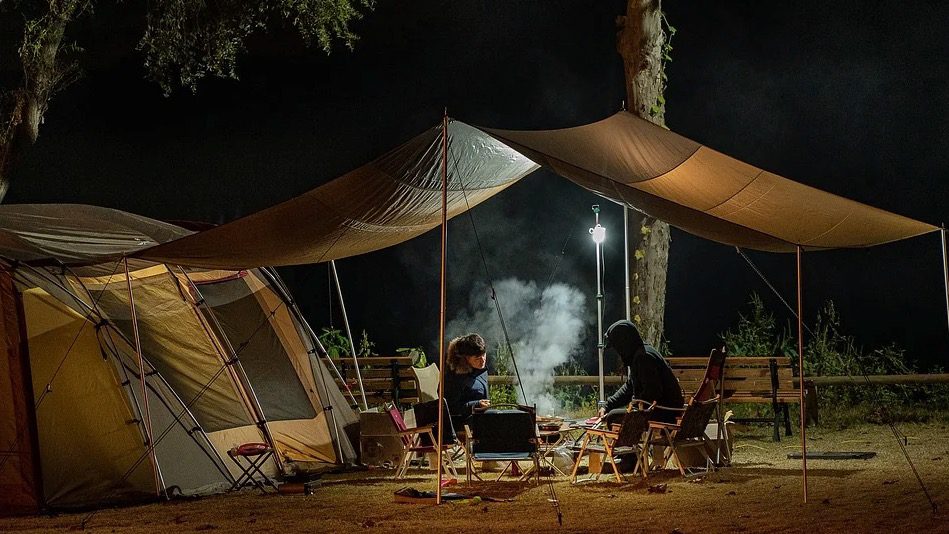
Power Capabilities
The best way to make sure you’re camping experience is going to be great is by taking an inverter generator with enough wattage to hook your essentials too.
I mean, who wants to run out of electricity in the middle of nowhere?
I’d say the best inverter generator for camping should come at least with 2,000 starting watts and 1,500 running watts. That way, you’ll have the guarantee your camping trip isn’t gonna be ruined by your inverter generator.
Pro-tip: Keeping extra fuel at hand (safely stored) to refill your inverter generator once is empty is a must for some. So, you might wanna think about doing that, especially if you plan on plugging power-hungry equipment into your generator.
Fuel
Fuel is another important element for inverter generators. Depending on where you live, the costs of maintaining an inverter generator are going to change.
I mean, inverter generators can be powered by:
- Gasoline
- Propane
- Diesel fuel
In fact, some inverter generators can take even two fuel types (a.k.a. dual fuel inverter generators).
What I’d do would be to check fuel prices where you live and then choose an inverter generator that’s powered by the cheapest fuel type. That way you’ll substantially reduce costs which is always nice.
Tank Size
The best inverter generator for camping must provide a decent runtime. To achieve this, the generator’s tank size must be sizeable. Otherwise, you run the risk of running out of fuel in the middle of your camping trip.
To be more specific, I’d say that an inverter generator with at least a 1.5-gallon fuel tank would be perfect. This way, you’ll make sure you’ll have enough fuel to burn throughout the camping day avoiding running out of juice in the middle of the day.
Voltage Reliability
Voltage, in short, is the pressure of the electrical current that powers devices when they’re hooked to an outlet.
Sadly, a lot of inverter generators don’t provide a steady voltage stream which could put your expensive gadgets at risk (phones, laptops, etc…).
Due to this, I can’t stress enough how important it is to find an inverter generator that provides what I call “voltage reliability”. Meaning, a generator that doesn’t burn your costly devices due to irregular voltage.
I mean, who wants to get their camping day ruined by an inverter generator that decided to malfunction and completely wreck their phone/laptop?
Noise Levels
You can’t enjoy your camping day if your inverter generator is annoyingly loud.
This is why I recommend people to look for inverter generators that operate between 50 and 70 decibels of noise.
That way, you’ll make sure the noise made by the generator is about the same that the one made in a conversation, which is certainly
Portability
There’s nothing more annoying than carrying a heavy and bulky generator around at the campsite. I mean, you’re supposed to relax and enjoy your time, right?
Well, to avoid those situations I recommend people interested in finding the best inverter generator for camping to get one with never-flat wheels or at least ergonomic handles. Any of these features will make generators much more portable.
Also, I’d say it shouldn’t weigh more than 100 pounds, otherwise, it’d be too heavy to carry around.
Durability
Who wants to waste hundreds of dollars on an inverter generator that doesn’t last more than a few months? Nobody.
To avoid this, I recommend people spending their hard-earned money on an inverter generator made with top-quality materials and manufactured by a recognized brand (i.e. Generac, WEN, Westinghouse, Champion, etc).
This is the best way that I know of making sure your generator is going to last for at least a few solid years. Otherwise, who would those brands still be relevant in today’s world?
Pro-tip: Getting an inverter generator with a solid warranty program is also another way to make sure your investment is well secured.
Frequently Asked Questions
There are frequent questions about getting the best inverter generator for camping. These are some of them:
How does an inverter generator work?
In short, what an inverter generator does is converting fuel into clean electricity with the help of a motor and its alternator.
Traditionally, regular generators use alternators to generates alternative current power (“AC” power) which is the power the comes from normal outlets. The thing is that this AC power is not free of electrical surges which put expensive gadgets at risk.
Inverter generators, on the other hand, have a more advanced technology that allows them to produce cleaner power (with no electrical surges) to protect sensitive electronics from breaking.
To do this, an inverter generator produces AC power, then transforms it to direct current power (a.k.a. DC power) to finally transform it back to AC power. That way, the inverter generator controls the whole process making sure the power generated is completely clean.
Fun fact: Due to their high-level electronics, not only inverters provide cleaner power, but they also do it in a much quieter way as they adapt the motor operating levels to the different electrical demands. This is essential to improve the experience when camping in the outdoors.
What is an inverter generator good for?
Well, inverter generators are known for:
- running very quiet
- being efficient in the way they use fuel
- having lighter and portable structures
- providing clean electricity free from electrical surges
So, I’d say that knowing this, an inverter generator would be perfect for social gatherings where people don’t want a loud generator running in the background.
One perfect example would be camping out with your family… who wants to have a noisy generator ruining the whole experience? You’ll be much better with a quiet inverter generator.
How many watts does an inverter generator need for camping activities?
This is going to depend on the number of electronics you’re going to hook up to the generator.
In my experience, for me and my family, with an inverter generator with a wattage of 1500 running watts and 2000 starting watts, it’s enough. However, I do know people that need at least 2500 running watts.
So, what I’d do would be to note down all the electronics you’re planning on hooking to the generator and also write down how much wattage they consume. From there, you’ll be able to quickly calculate how much wattage your inverter generator would need for your camping activities.
Do inverter generators for camping need maintenance?
Of course, they do. Any piece of equipment that has high-level electric components and a motor needs maintenance.
In the case of inverter generators, they need oil to keep the motor from overheating and breaking down.
My recommendation would be to read the user’s manual that comes with your generator and learn how often you should put oil in your inverter generator and what type of oil it needs. That way you’ll make sure that the hundreds of dollars you spent on your generator won’t go down the drain.
